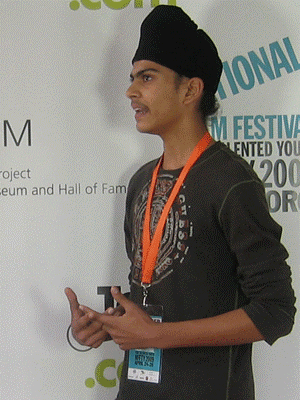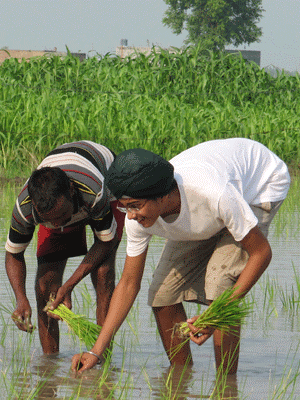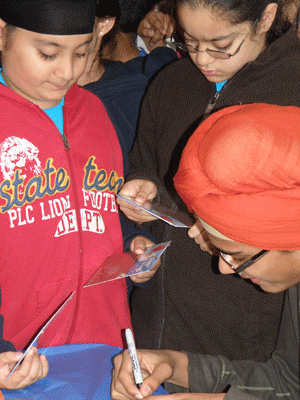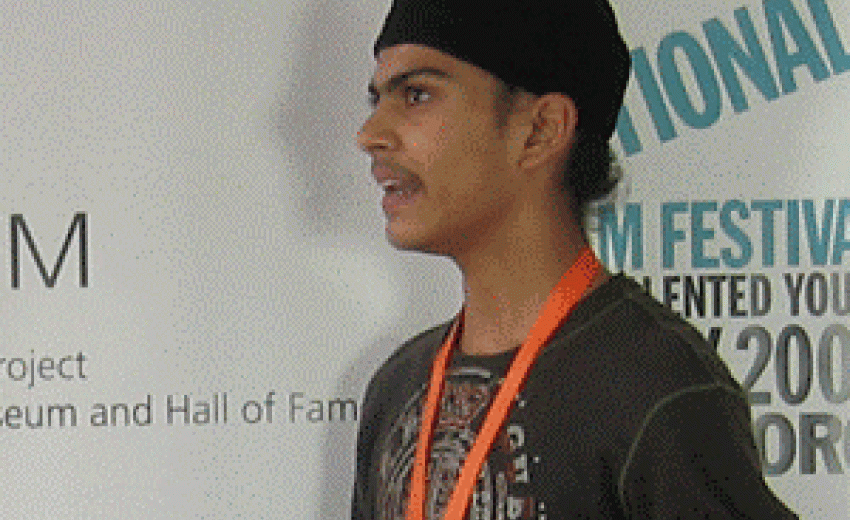 He is instantly captivating.
He is instantly captivating.
Angad Singh stands tall: given that he is six feet and a few inches and has accomplished more at 16 than most twice his age. Independent film-maker, self-proclaimed peace activist, confident orator, straight A student, saxophone player ... and we're still far from done.
However, more than his achievements, his personality is far more impressive. This American teen who "loves reaching out to people, especially youth," and does a formidably good job of it - to quote a friend, "Every time you meet him, you like him more and more." - is gifted with an inner fragrance and casual simplicity.
I first met Angad in the fall of 2008, just a few days shy of his 15th birthday. His film Roots and Wings had kick-started the Spinning Wheel Film Festival in Toronto, Canada, the previous day and the response had been tremendous.
I was struck by his simplicity, sincerity and eloquence. Large eyes dominated a handsome face that would, every now and then break into a shy yet ready smile. In an age of smart packaging and almost glib confidence, Angad's quiet faith in himself and his ability to give life to the things he stands for are a breath of fresh air.
Following are excerpts from our conversation in 2008:
How did the idea for Roots and Wings come about?
I was invited to the Sikh Camp in West Virginia to teach film-making. The best way to teach something is to show someone how it's done, so I took along a cameraman and decided to make a documentary. I had an idea and wanted to see how far it would take me. I also wanted to interview the kids at camp, to see what their opinions were, to find out how similar or different their experiences were compared to mine; and how much it affected them.
What made you realize the best way to teach is by example?
That's what the Gurus did. They taught us by example - Guru Nanak taught us not to discriminate, Guru Amardas set the standards for seva and pangat, Guru Gobind Singh himself fought the battles against tyranny - he didn't just send the Sikhs out there, he was there himself.
What kind of example are you?
I see myself as a Sikh-American youth. I like playing basketball and love playing the sax in the school's marching band. I like the same music, the same food, same type of clothes (like other American kids) ... it's just that sometimes I eat roti-sabzi at home.
My turban is an additional responsibility but it also empowers me - I feel great when I get those around me to understand, to live with it. So if I can do this, I can do a lot.
Why do you think things really haven't changed much over the last generation?
Kids face problems all the time, but no one does anything about it because it's just not in their interest. And even though there's a lot of information out there on TV, it's often incomplete or biased. There's a lack of firsthand knowledge. Half knowledge is a dangerous thing. It is important to educate people to do away with the intolerance.
How much can one person change things?
I am inspired by our problems; why we have the problems we do and how can we change things? Change is tough but it must start with the average person. I see it as a pyramid with the average person making up the base. So, when we start at the bottom we lay a strong foundation for change. If we start at the peak (of the pyramid), society would probably topple over. I am aiming at Diversity programs in schools, educating people, talking to them. We can hold talks for middle-school kids, read out to (those in) kindergarten, show movies ... spread the word.
Where do you go from here?
My film is still a work in progress. In the next installment (of Roots and Wings) I will be interviewing teachers and policy-makers. It is important to educate people on diversity, and when that education comes from a person of authority it makes all the more difference.
* * * * *
In the winter of 2006, Gurmeet, Angad's mom and volunteer organizer at the Gurmat Youth Camp invited Ish Kaur, Director of the Punjabi film Kamdi Kalai. Ish motivated the kids to step out with their cameras and attempt short films for the then upcoming Sikhnet Youth Film Festival.
"One of them listened," Angad wrote in a personal recount on Sikhnet when ‘One Light' (Angad's first film) celebrated over a year of accolades. "...you guessed it right. It was me. ‘One Light's' seed was planted then because I listened to her (or was made to listen to her by my Mom)."
A few months after the camp, Angad attended a three-week course on International Relations at Duke University TIP. There he learnt that "the major source of conflict in this world is dwelling on differences, whether they are in religions, cultures or races," followed by a "fear of the unknown."
That got him thinking, and this is what he came up with - "What if we started acknowledging similarities between people and slowly learn about the uniqueness each one has to offer? Then there will be no ignorance about each other and hence no fear and no conflict."
With this in mind, Angad picked up the camera to seek answers to six simple questions from his next-door neighbors, and began his film-making career at age 13 in the summer of 2007.
* * * * *
Tell me what the film One Light means to you?
I started out seeking to have a simple conversation with my neighbors. The film came to have a life of its own. People discriminate when they fear. And one always fears the unknown. That is why it's important that people get to know each other. Even with your own neighbors, you can live next to their homes for years but you don't get the opportunity to ask questions like, ‘Why do you wear a turban?' These questions need to be answered. Or else people interpret things in their own way; they find answers they are comfortable with rather than taking the time and trouble to get to the actual truth.
Have you ever been discriminated against?
(Shrugs) ... At times I have faced verbal abuse, been pushed around by kids asking why are you wearing a ball on your head?
I do get tired of hearing the same things over and over again like, "Lose that hat!" If I weren't a Sikh, I wouldn't have these problems. But then I would not question myself since I wouldn't identify with the problems and think about them.
What questions are you asking yourself these days?
Can we do something to change the intolerance? Is there a way to change the thinking of a considerable majority of people? You can't leave it to someone else to solve your problems. My hope as a Sikh is that we (as a public) do not generalize people on the basis of how they look.
Your films have been screened in festivals, schools and seminars. They have opened many opportunities for you. What's has been your favorite part?
I love everything that I get to do after making the film. Talking and connecting with the kids and the workshops are by far my most favorite part. (After Roots and Wings), I've received letters from disabled kids simply because they identified with being singled out, being taunted ... I really treasure those letters. It's neat to know that you've changed someone's life because you've changed the way they look at things.
* * * * *
It was more than a year later, at the end of 2009, that I met Angad again. A lot had happened in that year. His film Roots and Wings had taken him many paces forward. He became more visible in the Sikh community. He started a new film, had a sixteenth birthday and changed his style of turban, a "more formal style," the full puggh. He had grown taller, also more serious, intense and quieter. His latest 'baby step' is a third documentary - a unique take on the French government's ban on the 'display' of religious symbols in schools as a consequence of which Sikh students are not allowed to wear turbans and karras to school.
Recently, Angad and his mother Gurmeet played hosts to a French exchange student who may have been more than a little surprised to find himself in a different sort of American household.
Following are excerpts from a recent interview with Angad:
What have you been working on the past year?
Touring around the country with Roots and Wings - taking it to schools, film festivals and Sikh youth through local gurdwaras. I am working to educate and empower the youth in playing a larger role towards diversity education in our schools. I also traveled to Punjab this past summer. It was the 25th anniversary of the 1984 Sikh Genocide and we (Mum and I) wanted to do something small but personal. We wandered into villages and talked to kids and families, went to Sikh schools and spoke with many children. We also visited a Drug Rehabilitation Center. I wanted to learn as much as I could.
 In Punjab, I got to plant rice in a paddy field and bathe the buffalos. I visited several historical gurdwaras. In short, I connected with my spiritual homeland, Punjab. And I also started to work on my third film.
In Punjab, I got to plant rice in a paddy field and bathe the buffalos. I visited several historical gurdwaras. In short, I connected with my spiritual homeland, Punjab. And I also started to work on my third film.
Can you tell us something about your new film?
It has the same theme as One Light and Roots and Wings - the theme of peace, of friendship. However, it takes the idea of inter-cultural understanding to a global level.
How did the idea come about?
I study French at school. We have an Exchange program where French kids visit and study with us for two weeks. I was curious as to what they perceive of America and decided to capture their American experience.
Where do you want to see this film go? What do you hope to achieve with it?
(I want it to go) To the young people in the world - particularly to the students in France. One of my goals is to have them understand the Sikh turban from a personal viewpoint, so that they can open their minds towards it. Another goal is to tell the world that people are not what (picture) is painted by the governments and media.
Are you planning to go to France as an exchange student any time in the future?
I was in France this past summer on my way to India, for two weeks. For one week I was there as an exchange student. I don't know if I will have another opportunity to travel before school finishes. I may go there with my next film. I would love that.
When you attended school in France were you allowed to keep your turban?
Of course! We made sure of it upfront. I went in a dastaar and gave a talk on Sikhi in the school. The kids were shocked about the law in France. This was a private Catholic school so they were more accepting (than French public schools).
How do you feel you've grown over the last year - as a film-maker? As a person? What changes do you see in yourself?
I have grown taller. My (latest) film is a bit more professional; better camera, better editing and a more interesting story (line). My projects may be getting complex but the message remains simple. And I have a new turban style. I now wear a formal turban to school.
Do you think the USA is more open to the message of Roots and Wings now? Under its new leadership do you see any change of attitudes?
We have a long ways to go. As many people love President Obama for his character, there is significant number of people that hate him for his color and would love to see him fail.
How would you describe yourself?
 Tall and awesome!
Tall and awesome!
What are you favorite subjects in school?
World History, because I get to learn about other cultures and peoples. And I love playing the sax. I plan to play it all the way through school.
And what are your future academic plans?
I plan on going into International Relations.
What are you asking yourself these days?
How can I have more time to have fun? When can I have my friends over?
What qualities do you admire?
Calmness in the face of turmoil; courage in the face of adversity; compassion when surrounded by hatred; and honesty in a sea of corruption.
Who would you consider your mentors?
My hero is no doubt Guru Nanak. For he was able to inspire the oppressed to have confidence in themselves - to rise up against all sorts of exploitations and manipulations - religious, political, social, class and caste based and in the worst time and place in history. I don't know if I have a mentor.
* * * * *
Undoubtedly, one of Angad's strongest influences is his mother, Gurmeet Kaur.
He says, "It's hard to describe her in words. She is very passionate about the environment and Sikhi. She has given me all that I need to be successful; she inspires me to live a life of service to humanity and to always walk the path of Sikhi."
Gurmeet's poise, her unabashed passion for all that is close to her heart, the relentless drive with which she volunteers at youth camps and organizing community events has provided Angad with a rock-solid religious and spiritual base and continues to do so.
It is this base that adds to Angad's uncanny ability to find a way through seemingly daunting situations, coming up with a simple, effective solution through his chosen medium - film. Through his films and with them he continues to mature creatively and spiritually. So far, each film has served as a stepping- stone leading him to his next venture.
During the course of our conversations, Gurmeet often refers to Angad as her 'blessing'. It is obvious that mother and son are close.
Some of us inherit Sikhi, some of us are blessed with it.
Angad is both. His "hero" Guru Nanak has blessed him with serenity and modesty, and the ability to follow his heart without getting waylaid by any accolades or setbacks that may fall on his path. Not surprising then that he stands tall.
Please visit www.onelight-films.com for more information.
Gurmat Camp Organizers and Parents: please go to the following link to leverage ‘Roots & Wings' to educate your child's school: here'san_idea_for_your_summer_camp
[Courtesy: Nishaan]
